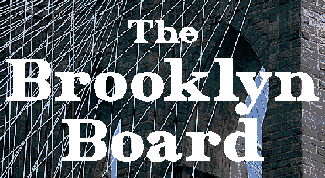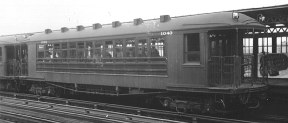
For displaced, misplaced, and nostalgic ex-Brooklynites |
|
Chocolate 1944 A n icy wind swept across the Sumner Avenue elevated station in Brooklyn and I shivered underneath my light woolen jacket. It was 6:30 in the morning on a freezing day early in April. I shifted my lunch bag and schoolbooks from one hand to another as I waited. The soft orange light washed away the harsh corners of the tenements facing the El, and fought a losing battle against the perpetual darkness underneath the trestles supporting the tracks. The elevated train emerged from the darkness into the half-light of the early morning. The two cars were ancient relics with tin roofs and wicker seats. There was an open space between the two cars where it was possible, but forbidden to stand in the open air. The train arrived, shaking the rickety old station and causing several loose boards to drum out a welcome. The conductor positioned himself in the open space and manually opened the gate with two levers. He refused to let anyone stand next to him except me. I was fourteen and in 1944 it was the wrong age: I was too young for the war. The conductor, Mr. Kelsey, was too old. He compensated for both of us by letting me stand next to him in defiance of all authority. When I took my place on the platform, the conductor turned and said, "It's a bit chilly, son. Wouldn't you like to go inside?" I shook my head, afraid that the privilege would be revoked if the position were abandoned for even one minute. The train started and moved away from the station with the peculiar swaying motion common to elevated trains. I stood next to Mr. Kelsey, watching the tenement windows display the first signs of life. Invariably it was a man in an undershirt, drinking coffee and watching the train go past.
I watched them. I had been watching them for weeks. They always stayed in the same position until the Borough Hall stop; then she would leave the train. The red-faced man would leave the train at its last stop on the Manhattan side of the bridge. They never spoke. At the Borough Hall stop, she left the train. The train was near the waterfront. I smelled the first hint of the docks: a combination of East River salt and smoke with a touch of chocolate from the Ex-Lax factory at the foot of the bridge. The pungent fragrances tickled my nose. Visions of exotic ports, musty old freighters and rolling waves on the open sea passed in front of my eyes. I glanced back at Mr. Kelsey and found him smiling. The train reached the Brooklyn Bridge Station on the Manhattan side. I waited until all the passengers left and walked down a long metal stairway after saying goodbye to Mr. Kelsey. |
Copyright ©2002-2024 SofTech Consulting, Chappaqua, New York, USA All Rights Reserved.
 At the Nostrand Avenue Station, the woman boarded. She was tall, buxom, with brown hair tied
in a bun; she wore a thin cloth coat with an open collar that revealed a printed, floral dress. By
now the train was crowded, and she stood in the center of the car with her hand on one of the
vertical poles. At the next stop, the red-faced man boarded the train. He was heavy-set with a
chubby, florid face, and he wore a double-breasted overcoat with a pork-pie hat. He went
straight to the woman with the floral dress, stood behind her and leaned his body against her.
She glanced at his face without changing her expression, and then she pressed her body against
him. They didn't exchange a word.
At the Nostrand Avenue Station, the woman boarded. She was tall, buxom, with brown hair tied
in a bun; she wore a thin cloth coat with an open collar that revealed a printed, floral dress. By
now the train was crowded, and she stood in the center of the car with her hand on one of the
vertical poles. At the next stop, the red-faced man boarded the train. He was heavy-set with a
chubby, florid face, and he wore a double-breasted overcoat with a pork-pie hat. He went
straight to the woman with the floral dress, stood behind her and leaned his body against her.
She glanced at his face without changing her expression, and then she pressed her body against
him. They didn't exchange a word.